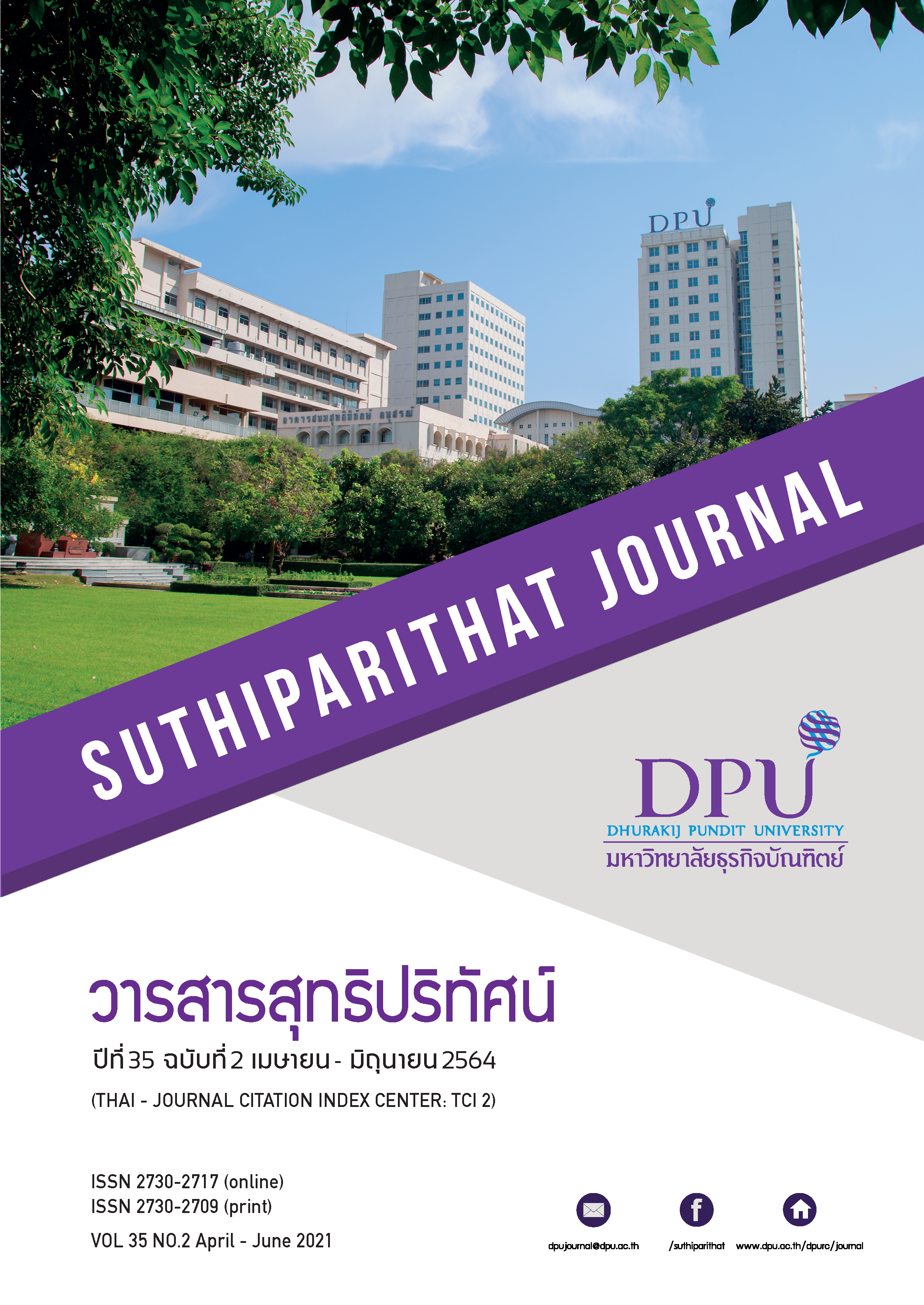การวิเคราะห์องค์ประกอบเชิงยืนยันของแบบวัดความสามารถในการปรับตัว ทางอาชีพของนักศึกษาปริญญาตรีหลักสูตรนิเทศศาสตร์ในเขตกรุงเทพมหานคร
คำสำคัญ:
ความสามารถในการปรับตัวทางอาชีพ, การวิเคราะห์องค์ประกอบเชิงยืนยัน, นักศึกษานิเทศศาสตร์บทคัดย่อ
การวิจัยครั้งนี้มีวัตถุประสงค์เพื่อวิเคราะห์องค์ประกอบเชิงยืนยันของแบบวัดความสามารถในการปรับตัวทางอาชีพของนักศึกษาปริญญาตรีสาขาวิชานิเทศศาสตร์ กลุ่มตัวอย่างคือ คือ นักศึกษาปริญญาตรีชั้นปี 4 หลักสูตรนิเทศศาสตร์ มหาวิทยาลัยในเขตกรุงเทพมหานคร จำนวน 118 คน โดยการสุ่มแบบหลายขั้นตอน เก็บข้อมูลด้วยแบบวัดความสามารถในการปรับตัวทางอาชีพ ฉบับภาษาไทย (สุรวิทย์ อัสสพันธ์ และเสมอกาญจน์ โสภณหิรัญรักษ์, 2561) จำนวน 24 ข้อ ผู้วิจัยได้ปรับปรุงข้อคำถามให้สอดคล้องกับบริบทของกลุ่มตัวอย่างในการศึกษาครั้งนี้ ผู้วิจัยใช้เทคนิคการวิเคราะห์องค์ประกอบเชิงยืนยันอันดับที่สอง เพื่อตรวจสอบความสอดคล้องกลมกลืนของโมเดลกับข้อมูลเชิงประจักษ์ และผู้วิจัยได้ตรวจสอบความเที่ยงตรงเชิงเนื้อหาจากผู้ทรงคุณวุฒิ จำนวน 3 ท่าน มีค่า IOC ตั้งแต่ 0.67–1.00 และหาค่าความเชื่อมั่นของแบบวัดทั้งฉบับได้ค่าสัมประสิทธิ์แอลฟาของครอนบาค เท่ากับ 0.946 ผลการวิเคราะห์องค์ประกอบเชิงยืนยันอันดับที่สอง พบว่า แบบวัดความสามารถในการปรับตัวทางอาชีพของนักศึกษาปริญญาตรีหลักสูตรนิเทศศาสตร์ในเขตกรุงเทพมหานคร ประกอบด้วย ด้านความใฝ่รู้ในอาชีพ มีค่าน้ำหนักมากที่สุด รองลงมา ได้แก่ ด้านความมั่นใจในตนเองทางอาชีพ ด้านการควบคุมตนในอาชีพ และด้านความใส่ใจในอาชีพ ตามลำดับ ซึ่งแบบจำลองโครงสร้างการวัดองค์ประกอบความสามารถในการปรับตัวทางอาชีพประกอบด้วย 4 องค์ประกอบ มีความสอดคล้องกับข้อมูลเชิงประจักษ์ผ่านเกณฑ์ที่ยอมรับได้ (x2 = 261.61, df = 226, CFI = 0.99, RMSEA = 0.037, RMR = 0.061)
เอกสารอ้างอิง
กาลัญ วรพิทยุต. (2562). การโฆษณากับการปรับตัวเข้าสู่ยุคการปฏิวัติอุตสาหกรรมครั้งที่ 4.0 (รายงานผลการวิจัย). สืบค้นจาก https://searchlib.utcc.ac.th/library/onlinethesis/305300.pdf
เกียรติอนันต์ ล้วนแก้ว. (2561). ช่องว่างทักษะกับนัยยะที่มีต่อการพัฒนากำลังคนของประเทศไทย. สืบค้นจาก http://www.econ.tu.ac.th/symposium40/paper/003_Symposium40-%E0%B9%80%E0%B8%81%E0%B8%B5%E0%B8%A2%E0%B8%A3%E0%B8%95%E0%B8%B4%E0%B8%AD%E0%B8%99%E0%B8%B1%E0%B8%99%E0%B8%95%E0%B9%8C.pdf
ฐิตินันท์ พงษ์สุทธิรักษ์, และวีระยุทธ กาญจน์ชูฉัตร. (2547). บุคลากรสื่อไทย: สภาพปัญหาและแนวทางการพัฒนา. กรุงเทพฯ: จุฬาลงกรณ์มหาวิทยาลัย. doi: https://doi.nrct.go.th/ListDoi/listDetail?Resolve_DOI=10.14457/CU.res.2004.8
เบญจวรรณ ถนอมชยธวัช, ผ่องศรี วาณิชย์ศุภวงศ์, วุฒิชัย เนียมเทศ, และณัฐวิทย์ พจนตันติ. (2559). ทักษะแห่งศตวรรษที่ 21: ความท้าทายในการพัฒนานักศึกษา. วารสารเครือข่ายวิทยาลัยพยาบาลและการสาธารณสุขภาคใต้, 3(2), 208-222.
สำนักงานคณะกรรมการการอุดมศึกษา. (2563). สืบค้นจาก http://www.info.mua.go.th/info/
สุธาสินี นิรัตติมานนท์. (2560). การจัดการศึกษาระดับอุดมศึกษาสาขาวิชานิเทศศาสตร์ในศตวรรษที่ 21. วารสารวิชาการมหาวิทยาลัยราชภัฏภูเก็ต, 13(2), 204-226.
สุรวิทย์ อัสสพันธุ์, และเสมอกาญจน์ โสภณหิรัญรักษ์. (2561). การวิเคราะห์ความเที่ยงตรงเชิงโครงสร้างและเกณฑ์ปกติของแบบวัดความสามารถในการปรับตัวทางอาชีพ (Career adapt-abilities scale) ฉบับภาษาไทยของนักศึกษาปริญญาตรี ในเขตกรุงเทพมหานครและปริมณฑล. วารสารวิชาการศึกษาศาสตร์, 19(2), 167-181.
Crites, J. O. (1971). The maturity of vocational attitudes in adolescence. Washington, DC: American Personnel and Guidance Association.
Ebenehi, A. S., Rashid, A. M., & Bakar, A. R. (2016). Predictors of career adaptability skill among Higher Education Students in Nigeria. International Journal for Research in Vocational Education and Training, 3(3), 212-229.
Hair, J. F., Black, W. C., Babin, B. J., & Anderson, R. E. (2010). Multivariate data analysis (7th ed.). Pearson: New York.
Hair, J. F., Black, W. C., Babin, B. J., Anderson, R. E., & Tatham, R. L. (2006). Multivariate data analysis (6th ed.). New Jersey: Pearson Prentice Hall.
Hou, C., Wu, L., & Liu, Z. (2014). Effect of proactive personality and decision-making self-efficacy on career adaptability among Chinese graduates. Social Behavior and Personality: An International Journal, 42(6), 903–912. doi:10.2224/sbp.2014.42.6.903
Savickas, M. L. (1997). Career adaptability: An integrative construct for life-span, life space theory. The Career Development Quarterly, 45, 47–259.
Savickas, M. L., & Porfeli, E. J. (2012). Career adapt-abilities scale: Construction, reliability, and measurement equivalence across 13 countries. Journal of Vocational Behavior, 80(3), 661–673. doi:10.1016/j.jvb.2012.01.011
Tien, H.-L. S., & Wang, Y.-C. (2017). Career adaptability, employability, and career resilience of Asian people. In Psychology of career adaptability, employability and resilience (pp. 299–314). doi:10.1007/978-3-319-66954-0_18.
Tolentino, L. R., Garcia, P. R. J. M., Lu, V. N., Restubog, S. L. D., Bordia, P., & Plewa, C. (2014). Career adaptation: The relation of adaptability to goal orientation, proactive personality, and career optimism. Journal of Vocational Behavior, 84(1), 39–48. doi:10.1016/j.jvb.2013.11.004
Urbanaviciute, I., Kairys, A., Pociute, B., & Liniauskaite, A. (2014). Career adaptability in Lithuania: A test of psychometric properties and a theoretical model. Journal of Vocational Behavior, 85(3), 433–442. doi:10.1016/j.jvb.2014.09.005
Zacher, H. (2013). Career adaptability predicts subjective career success above and beyond personality traits and core self-evaluations. Journal of Vocational Behavior, 84, 21–30.
ดาวน์โหลด
เผยแพร่แล้ว
รูปแบบการอ้างอิง
ฉบับ
ประเภทบทความ
สัญญาอนุญาต
เนื้อหาและข้อมูลในบทความที่ลงตีพิมพ์ในวารสารสุทธิปริทัศน์ ถือเป็นข้อคิดเห็นและความรับผิดชอบของผู้เขียนบทความโดยตรงซึ่งกองบรรณาธิการวารสาร ไม่จำเป็นต้องเห็นด้วย หรือร่วมรับผิดชอบใด ๆ
บทความ ข้อมูล เนื้อหา รูปภาพ ฯลฯ ที่ได้รับการตีพิมพ์ในวารสารสุทธิปริทัศน์ ถือเป็นลิขสิทธิ์ของวารสารสุทธิปริทัศน์หากบุคคลหรือหน่วยงานใดต้องการนำทั้งหมดหรือส่วนหนึ่งส่วนใดไปเผยแพร่ต่อหรือเพื่อกระทำการใด ๆ จะต้องได้รับอนุญาตเป็นลายลักษณ์อักษรจากวารสารสุทธิปริทัศน์ก่อนเท่านั้น







